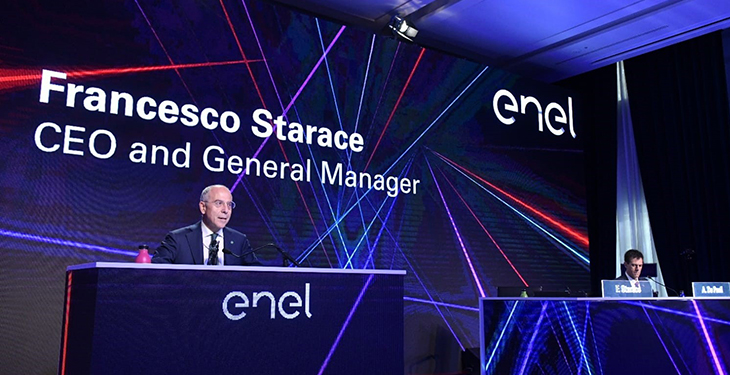Bogdan Tudorache
Enel presented a new strategic plan for the period 2020-2022. The plan includes decarbonisation of the global generation fleet will account for 50% of total planned investments, with 14.4 billion euros devoted to the accelerated deployment of new renewable capacity and the progressive substitution of coal generation. By 2022, the Group is expected to develop 14.1 GW of new renewable capacity (+22% vs. previous plan) and reduce coal capacity and production by 61% and 74%, respectively, vs. 2018. The share of renewables on total capacity is due to reach 60% in three years, driving upwards the generation fleet’s profitability as well as increasing CO₂–free production to 68% in 2022. Enel’s investments in decarbonisation are expected to contribute 1.4 billion euros to Group’s EBITDA growth.
Around 1.2 billion euros of capex will address the Electrification of consumption, leveraging on Enel’s expanded and diversified retail customer base, as well as on efficiencies associated with the platformisation of Group activities. Investments are expected to yield 0.4 billion euros in EBITDA growth and position Enel for the future uptake of electrification-driven consumption.
A total of around 13 billion euros will be invested in the drivers of the energy transition, based on the two main trends of decarbonisation and electrification, and which offer several value creation opportunities: Enabling Infrastructures: 11.8 billion euros will be invested in the continued digitalisation and automation of grids, fostering resiliency and quality of service, ultimately aimed at contributing 0.7 billion euros to the growth of Group EBITDA; ecosystems and Platforms: 1.1 billion euros will be dedicated to Enel X for the ongoing deployment of services and infrastructure to support decarbonisation and electrification, leveraging on its platform-based model and aimed at contributing 0.4 billion euros to the growth of Group EBITDA; and total organic capex: 28.7 billion euros, up 11% vs. previous plan, leading to an expected EBITDA of 20.1 billion euros in 2022 (+13% vs. 17.8 billion euros expected in 2019). Capex allocation directly targets three main SDGs, which account for around 95% of the Group’s overall investments: SDG 7 (Affordable and Clean Energy), 9 (Industry, Innovation and Infrastructure) and 11 (Sustainable Cities and Communities), all contributing to the achievement of SDG 13 (Climate Action). Enel contributes to all other SDGs by promoting a sustainable business model and employing sustainable behaviours.
Net ordinary income is planned at 6.1 billion euros in 2022 (+27% vs. 4.8 billion euros expected in 2019), with the 2021 target up by around 200 million euros vs. previous plan. The share of sustainable finance sources, such as SDG-linked bonds, on Enel’s gross debt is expected to increase to approx. 43% in 2022 and to around 77% in 2030 from approx. 22% currently, supporting a sharp reduction in cost of debt.
Also, Enel will continue to pay, over the whole plan period, the highest amount between 70% of Group net ordinary income and a minimum guaranteed Dividend Per Share (DPS), with a compounded annual growth rate of 8.4% for the implicit DPS and 7.7% for the minimum DPS. Minimum DPS up by 1 eurocent/share in 2020 and 2021 vs. the previous plan, with a new target of 0.40 euros/share in 2022
“The plan that we are presenting today underscores the success of the sustainable and integrated business model that we have deployed since 2015, targeting the opportunities in the power sector connected with the global decarbonisation and electrification trends. Thanks to this approach, Enel is now a more sustainable, efficient and profitable organisation, with a substantially lower risk profile and a greater capability to rapidly adapt to change”, said Francesco Starace, CEO and General Manager of Enel.
”Enel’s 2020-2022 Plan is also based on the inherent sustainable business model that we have built, while working along the two global trends that are shaping the energy sector: decarbonisation and electrification. The digital transformation of our large network business and the platformisation of all our customer-related activities are key enablers of this plan, boosting efficiencies and introducing additional services,” he added.
